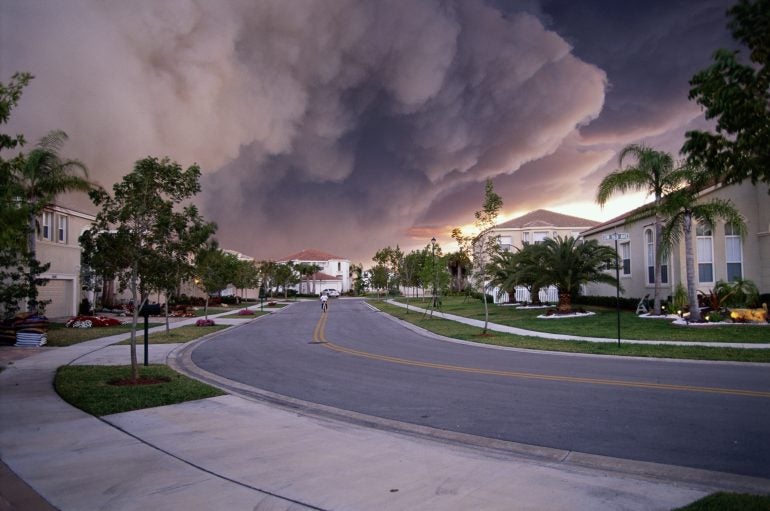
5 min read
This story originally appeared on NerdWallet
Homeowners insurance non-renewals are on the rise as private insurers steer clear of locations at high risk for natural disasters. The West Coast’s blazing wildfires are leaving some Californians scrambling to find coverage, while many Floridians are facing non-renewals during hurricane season.
In the midst of changing climate conditions and increasing weather-related catastrophes, it’s more crucial than ever to have insurance coverage for your home to have peace of mind. Here’s what to do if your homeowners insurance policy isn’t renewed.
1. Know your rights
An insurance company is usually required to provide a non-renewal notice, typically at least 30 days prior to the end of coverage, unless you’ve missed a payment or committed fraud on your application. But you might get more time to find a new policy. For example, Florida homeowners could get up to 120 days’ notice, according to Stacey Giulianti, chief legal officer for Florida Peninsula Insurance Company.
If you believe you were wrongly dropped, you can contest the non-renewal. You’ll likely need to prove that your home isn’t in a high-risk area, or that you’ve made efforts to mitigate that risk, like replacing the roof or removing flammable shrubs near your house.
2. Make home improvements
If your policy isn’t renewed because of a failed inspection, making the proper updates could help you maintain coverage, even if you’re in a high-risk area.
Inspections give homeowners the opportunity to fix problems, like leaky roofs or exposed electrical wiring, so they can keep an insurance policy, according to Michael Peltier, media relations manager for Citizens Property Insurance.
When making improvements, consider upgrading your home’s building materials. Newer materials may withstand weather catastrophes better than older ones while simultaneously lowering your insurance costs, Giulianti says. “The houses that are a hundred years old … aren’t going to withstand storms the same way as a brand-new concrete building.”
Building upgrades could include:
- Replacing walls with ignition-resistant materials like stucco or fiber-cement siding to mitigate fire damage.
- Switching to impact-resistant shingles to prevent roof damage.
- Installing hurricane-resistant windows if you live on the coast.
3. Shop around for another policy
Your previous insurer may not be an option, but you should still shop around. “There’s almost always another company … that will pick you up,” Giulianti says.
An independent insurance agent can research home insurance quotes for companies in your area. You can also ask your real estate agent, mortgage lender, homebuilder or previous owner for a list of companies, or call your state’s insurance department.
4. Turn to your state’s shared market option
If you still can’t find coverage, you may need a state-run shared market policy. Many states offer Fair Access to Insurance Requirements policies for high-risk homes, or beach and windstorm plans for coastal properties. Aptly named “last-resort” policies, FAIR policies offer limited coverage and are often more expensive than a standard home policy from a private insurer.
California’s FAIR Plan
The California FAIR Plan sells insurance for damage from fire, lightning, internal explosions and smoke, with optional coverage available at an additional cost. As wildfires worsen in the state, more customers are turning to the FAIR Plan for coverage, and this trend is expected to continue, Natalie Haskell, a spokesperson for the California FAIR Plan, wrote in an email.
But these policies don’t cover everything standard homeowners insurance policies do, like personal liability, your belongings or additional living expenses. For more extensive coverage, homeowners in California need to purchase a “difference in conditions” policy that complements FAIR Plan coverage to create a comprehensive home insurance policy.
Florida’s state-run insurer
Citizens Property Insurance, Florida’s insurer of last resort, has also seen an uptick in policy sales. But the reasons differ — worsening hurricane seasons combined with increasing litigation have driven up home insurance costs and non-renewals in the state.
Citizens offers coverage similar to that of private insurers, including dwelling, personal property, other structures and additional living expense coverage, though limits may be lower. In some areas, the company also sells wind-only policies that cover damage from hurricanes and other wind-related catastrophes. Policies are available only through an independent agent.
5. Consider surplus lines
If you’ve exhausted all other options, surplus lines insurance may be available. Provided by specialized insurers that are regulated differently from standard companies, surplus lines offer coverage for risky properties when other insurers won’t. Available companies may vary by state, so speak with an insurance agent about surplus lines once you’ve been rejected by at least three other insurers.
More From NerdWallet
The article What to Do If Your Home Insurer Won’t Renew Your Policy originally appeared on NerdWallet.
https://www.entrepreneur.com/article/379751

